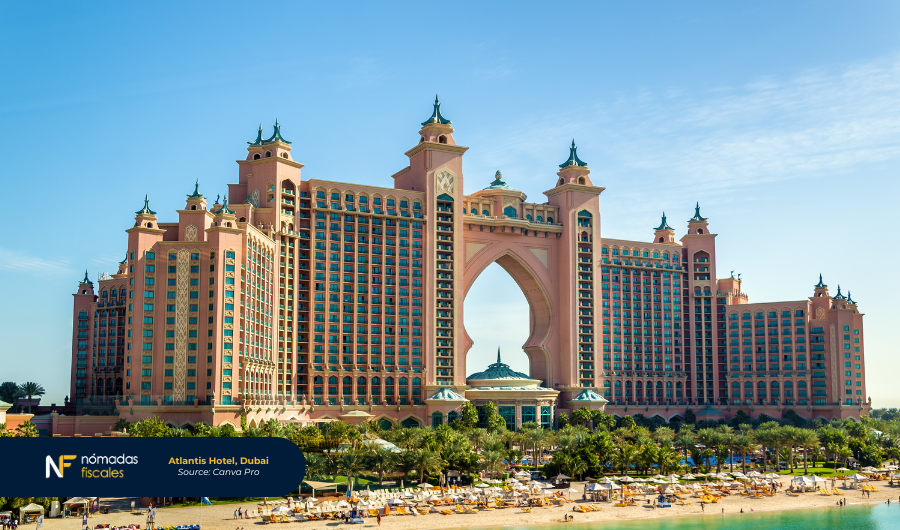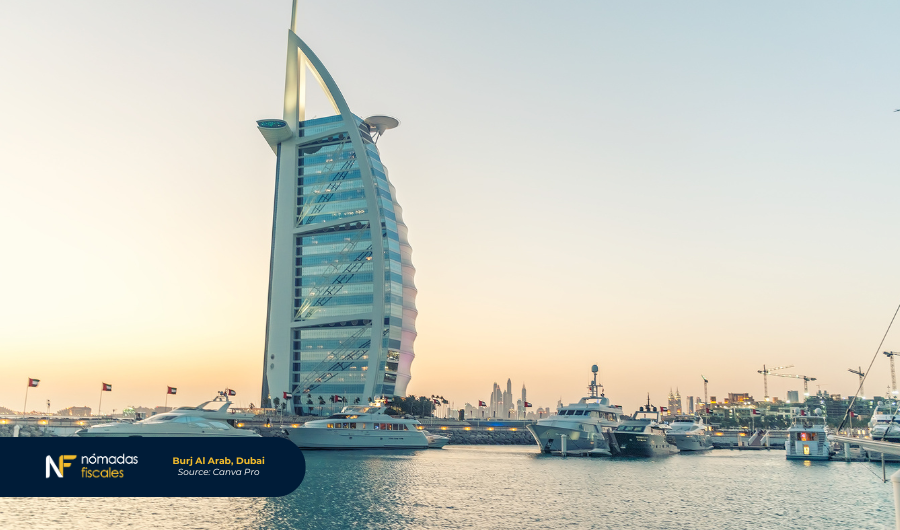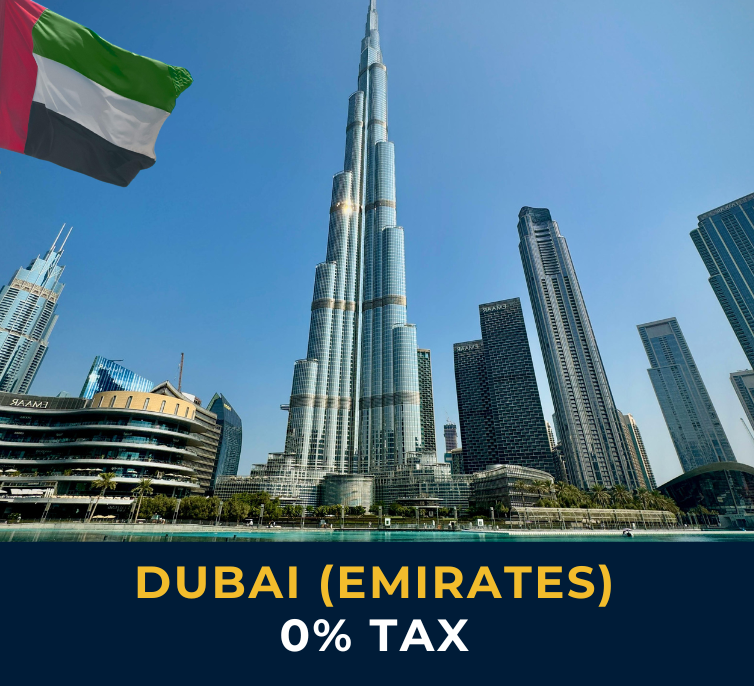For years, the United Arab Emirates, and especially Dubai, has become a symbol of tax nomadism.
It is a prime destination for global entrepreneurs who want to live a freer life, scale their businesses, and prosper with the least possible tax burden.
The Emirates, as a whole, offer political and economic stability that enhances their appeal. The region has managed to transform its desert into an oasis of opportunities, with structures like the Burj Khalifa, the tallest skyscraper in the world, exemplifying the area’s modernity and luxury.
Beyond the tax benefits, the UAE offers a cosmopolitan quality of life with leisure options ranging from nightclubs and international events like the Formula 1 Grand Prix in Abu Dhabi and the UFC, to luxury shopping malls and five-star resorts.
Moreover, its transportation infrastructure is exceptional, with top-tier airports in Dubai and Abu Dhabi connecting the country to the rest of the world, facilitating frequent travel to Asia and other international destinations.
Life in Dubai combines modernity with a multicultural atmosphere, where 80% of the population is made up of expatriates, reflecting an environment of tolerance and coexistence among diverse cultures.
In this article, we reveal how you can make the most of the tax advantages of residing or starting a business in the United Arab Emirates.
Taxes in Dubai
In the United Arab Emirates, personal taxation presents one of the most significant advantages globally: tax residents do not face any income tax.
This covers everything, from employment income to capital gains, dividends, interest, wealth, luxury, donations, and inheritances.
In other words, there is no form of personal taxation.
Additionally, there is no exit tax, unlike in countries like Spain or the United States, where you may face charges on your assets when leaving the country.
Another major advantage is the network of over 100 double taxation treaties that the UAE has with other countries. This network allows for very efficient tax planning, minimizing withholding taxes and optimizing cash flow for both individuals and businesses.
And if you’re interested in the world of cryptocurrencies, the UAE remains in a favorable position by not imposing taxes on transactions or gains related to them.
One important point to keep in mind is to closely follow the official channels of the UAE to stay informed about any tax updates, as the system has undergone significant changes recently.
For example, in 2018, the UAE introduced a 5% VAT, which is still quite low compared to other countries. It’s important to note that this VAT only applies to transactions conducted within the country. Therefore, if you work with clients in places like the United States or the European Union, you won’t need to worry about this tax.
Also, since 2023, a Corporate Income Tax has been introduced in the UAE, which we will discuss further in the corporate tax section.
Tax Residency in Dubai (United Arab Emirates)

Obtaining tax residency in the United Arab Emirates has caused some confusion in recent years, mainly because, until recently, the country did not issue tax residency certificates something crucial for tax nomads seeking to change their residency and protect themselves from tax obligations in their home country.
Until recently, it was said that staying in the UAE for 90 days a year was enough to obtain a tax residency certificate. However, this was not correct, as the certificate issued did not meet international treaty requirements and was only valid locally.
It’s important to remember that a locally valid certificate is not sufficient if you are concerned about a potential tax residency conflict with another country.
Currently, to obtain this certificate in accordance with double taxation treaties with other countries, it is necessary to spend more than 183 days a year in the UAE. This ensures that you can benefit from the country’s tax advantages and adequately protect yourself against your original tax jurisdiction.
There has also been confusion with the idea that you could maintain tax residency by staying just one day every six months in the UAE.
This confusion arose because, in reality, this applies to residency permits, not tax residency. Residency permits in Dubai require you to visit the country at least once every six months; otherwise, you could lose your resident status. However, this does not translate into tax residency.
In the case of companies, you can apply for a tax residency certificate after the company has been established for at least one year.
Corporate Income Tax in Dubai
As we mentioned earlier, since the beginning of 2023, the United Arab Emirates has implemented a Corporate Income Tax, marking a significant shift in its tax policy.
Although this tax is not as high as it might seem, it is crucial to be aware of how it affects you.
The tax has two brackets: 0% on income up to AED 375,000 (approximately EUR 92,000) and 9% on any excess. This means that the maximum Corporate Tax rate is 9%.
However, there are ways to mitigate this impact.
Until 2026, companies with an annual turnover of less than AED 3,000,000 (around EUR 750,000) can benefit from the ‘Small Business Relief’, which exempts small businesses from paying taxes, simplifies their accounting and avoids audits.
Additionally, an important strategy is the director’s salary:
If you are the CEO of your company in Dubai, you can set a salary at market rates, which can comfortably reach up to USD 20,000 per month.
This salary is not subject to personal taxes in the UAE and becomes a deductible expense for the company.
Thus, you could have a company with a 0% tax rate of up to EUR 300,000 (not including additional salaries for partners or spouses).
Another option is to register your company in one of the UAE’s Free Zones. In these zones, the company may not be subject to Corporate Income Tax, provided it engages in qualifying activities. We will clarify which activities qualify later.
The United Arab Emirates does not have rules on ‘Controlled Foreign Corporations’ (CFC Rules), allowing for greater flexibility in international corporate structuring.
Moreover, withholding taxes are at 0%, facilitating maximum tax optimization in our international operations.
United Arab Emirates Free Zones
The Free Zones in the United Arab Emirates are a key tool for those looking to establish a company in the country with full ownership control.
Thanks to these zones, foreign investors can own 100% of their companies, something not possible outside of them (in some economic activities) due to regulations that limit foreign ownership to a maximum of 49%.
The UAE has more than 40 Free Zones spread across the country, each with its own characteristics and advantages. In Dubai, for example, there are prominent zones such as the Dubai Multi Commodities Centre, Dubai Silicon Oasis, and the International Free Zone Authority (IFZA). There are also Free Zones in Abu Dhabi and Sharjah, among others.
Each zone has its own fees, registration timelines, and visa options, so it’s essential to seek proper advice to choose the one that best suits your needs.
A significant advantage of the Free Zones is that, in some cases, companies registered within them may benefit from not being subject to Corporate Income Tax.
To qualify for this condition, the company must meet three main requirements:
Generate 95% of its revenue from qualifying activities, such as the manufacturing of goods, holding of shares and other securities, management and operation of ships, or fund and asset management activities.
Exclude certain activities that do not qualify for the exemption, such as transactions with individuals, income from intangible assets, or income from real estate.
Create value entirely within the Free Zone through employees and a local permanent establishment.
As you can see, not many businesses will meet all the requirements, but those that do can enjoy absolute tax advantages.
Holding Companies in the United Arab Emirates
The United Arab Emirates presents itself as an exceptional option for establishing an efficient holding structure, potentially achieving 0% taxes with a company in both Mainland and Free Zones.
In the Free Zones, companies engaged in asset holding and subsidiary management can benefit from a full exemption from Corporate Tax. This is because holding activities are included within the qualifying activities for this exemption.
In the Mainland, it is also possible to achieve a tax exemption on income from subsidiaries through the participation exemption regime.
This regime is similar to those found in other countries and requires meeting two main conditions:
Minimum Ownership: The holding company must own at least 5% of the subsidiary, or the value of this participation must be at least AED 4 million (approximately EUR 1 million).
Corporate Income Tax Test: The subsidiary must be subject to a Corporate Tax rate equal to or greater than 9%, which is the rate applied in the United Arab Emirates.
By meeting these requirements, the holding company in the Mainland can also enjoy a complete tax exemption on income earned from its subsidiaries.

Types of Residency in Dubai
The United Arab Emirates offers a wide range of options for legally establishing oneself in the country.
In this section, we analyze the main visas and residence permits that tax nomads and entrepreneurs are using to make the UAE their home or place of operations.
Investor Visa (Starting a Business in Dubai)
One of the most common ways to establish residency in the United Arab Emirates is through Investor Visas, which are obtained by registering a company in the country. These visas are available to those who decide to form a company in the UAE, and the number of visas that can be obtained depends on the Free Zone in which the company is registered.
The Free Zones offer different options regarding the number of visas that can be included with the establishment of a company, which can range from two to six visas.
The conditions and prices for these visas vary by Free Zone, so it is important to consider which one best suits your needs and budget.
Digital Nomad Visa in Dubai
Another option for residing in the United Arab Emirates is the Digital Nomad Visa, officially known as the Virtual Work Residency Visa.
This visa allows remote workers to live in the UAE for one year, with the possibility of renewing it annually.
To qualify, you must demonstrate a stable income of at least USD 5,000 per month, either through a contract with a foreign company or from a business outside the UAE.
It is the most affordable option for those who meet the requirements, but it involves the need for constant renewal.
Retirement Residence Visa
Another lesser-known alternative is the Retirement Residence Visa, which offers a residence permit valid for 5 years with the option to renew if the requirements are maintained. To qualify, you must meet at least one of the following conditions:
- Own property or properties with a total value exceeding EUR 250,000.
- Have savings exceeding EUR 250,000.
- Have monthly income exceeding EUR 5,000.
This option is ideal for those who wish to establish themselves in the United Arab Emirates after retirement.
Dubai Golden Visa (Residency by Investment)
The UAE Golden Visa, or residency by investment, offers a 10-year renewable residence permit if you acquire property valued at least EUR 500,000.
This type of visa is particularly interesting because it includes not only the holder but also their spouse, children, and parents, facilitating the relocation of the entire family
Dubai Residency and Companies Review
Despite the recent adjustments in the UAE’s tax system, it remains one of the best options for tax nomads.
It is true that, for digital nomads or freelancers who are not yet generating significant income, the cost of living in the UAE and the expenses associated with setting up companies can be high compared to other more affordable alternatives such as Cyprus, Panama, El Salvador, or Malta.
From a tax perspective, the UAE remains an excellent option, especially if your goal is to operate a company while residing there, benefiting from a tax-free salary and completely tax-free residency.
Opinions on living in the UAE vary. While some are excited about the idea of residing there, others may find that the lifestyle does not align with their personal preferences. However, it is undeniable that the country provides an exceptional environment for networking and business development.
In summary, from a tax nomad perspective, we consider the United Arab Emirates as one of our top recommendations and a prime location to include in your tax and business strategy.
Are you interested in obtaining tax residency or setting up a company in Dubai?
Or would you prefer a complete analysis of your situation to discover the best option for you?
In either case, we can help!
Simply request your FREE INITIAL CONSULTATION BY CLICKING HERE, or contact us directly via WhatsApp or through the form below.
Contact us
In Dubai, there are no taxes on personal income, capital gains, dividends, or inheritances.
VAT is 5% on transactions within the country.
Since 2023, the Corporate Tax in Dubai has been 9% on income exceeding AED 375,000 (approximately EUR 92,000). Companies with an annual turnover of less than AED 3,000,000 (EUR 750,000) can benefit from a 0% tax rate until 2026.
Additionally, companies in Free Zones may be exempt if they meet certain activity requirements.
Opening a company in the United Arab Emirates has a variable cost ranging from EUR 4,000 to EUR 10,000. The price depends on the chosen Free Zone, the number of visas required, and the type of business you wish to register.
To obtain tax residency in the United Arab Emirates, you must spend more than 183 days a year in the country. This ensures that you can benefit from the country’s tax advantages and protect yourself from potential residency conflicts with your home country.
To obtain residency in Dubai, you can choose from:
- Investor Visa: By registering a company in the United Arab Emirates.
- Digital Nomad Visa (Virtual Work Residency Visa): For remote workers with stable income of at least USD 5,000 per month.
- Retirement Residence Visa: If you have property, savings, or income that meet certain requirements.
- Golden Visa: By purchasing property worth at least EUR 500,000.
The Digital Nomad Visa, officially known as the Virtual Work Residency Visa, allows remote workers to reside in Dubai for one year, with the possibility of annual renewal.
To qualify, you must demonstrate a stable income of at least USD 5,000 per month. It is an ideal option for digital nomads who meet this requirement.
The Golden Visa of the United Arab Emirates is an investment residency visa valid for 10 years, and renewable.
It is obtained by purchasing property with a minimum value of EUR 500,000. This visa allows for the inclusion of the holder’s spouse, children, and parents, facilitating the relocation of the entire family.

